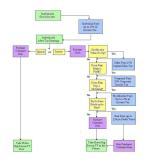In this interview on Fox Business, I repeated my oft-stated concern that the Federal Reserve’s easy-money policy of artificially low interest rates (avidly supported by Trump) may have created the conditions for a boom-bust cycle.
For today’s column, though, I want to focus on the part of the interview where I fret about structural rather than cyclical factors.
More specifically, whenever there is angst and concern about household debt, I get rather frustrated because some folks want to blame the American people for not saving enough.
That may be true, but I point out that the real problem is that the federal government lures people into being short-sighted.
- We have pervasive double taxation of income that is saved and invested (see accompanying chart),
 so the message from Uncle Sam is to immediately consume any after-tax income.
so the message from Uncle Sam is to immediately consume any after-tax income. - We have provisions in the tax code, such as the bias for debt over equity for businesses (somewhat mitigated by Trump’s 2017 tax plan) and the mortgage interest deduction for households, that encourage borrowing.
- We have a plethora of programs, such as Social Security, housing subsidies, unemployment insurance, college subsidies, and Medicaid/Medicare, that undermine incentives to save.
Given all these policies, I’m actually surprised that the national savings rate isn’t much lower.
By the way, I should emphasize that there’s nothing necessarily wrong with debt. It’s perfectly sensible for many households to borrow to buy a house, a car, or to finance education.
As I noted in the interview, what matters is keeping a sound ratio of debt to assets, and a sound ratio of interest expense to income.
It’s not easy for people to be sensible, however, when there are so many anti-savings policies from Washington.
I’ll close with a bit of good news.
Because the United States is a quasi-tax haven for foreigners, we do attract an immense amount of money from overseas. So even though the federal government discourages us from saving, we have access to capital from all over the world.
———
Image credit: 401(K) 2012 | CC BY-SA 2.0.

